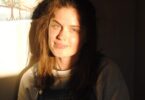Finn (not her name) described herself as a grief artist as though this were a familiar term, wanting to see how the person she was talking to asked for an explanation (chastened, as if they ought to have known already, in quotations, to make her feel foolish so they didn’t, not at all). To her, it was clear what she meant. She would create channels for grief on behalf of those who suffered, and she’d made proposals in which she decried the absence of ritual in western industrialized society and the resulting spiritual drought. She would create new rituals. She had grants from provincial and federal arts councils.
Her project would take place in a small stone house on the outskirts of the small city where she lived. The slabs of stone were squared, the mortar recessed, the house empty for a long time. It belonged to a friend’s aunt, who had not yet sold it because she wanted to renovate it first and did not know where to begin. So it sat, settling on itself. The stone was cool under Finn’s hands when she stood with her palms pressed against it in the dusk, though it was summer.
The house had pink curtains in the windows. Inside, it did not look old or mysterious, only dingy. Brown and white linoleum downstairs, and upstairs compressed dark broadloom that reminded Finn of a used scrubbing pad in the sink, with the same oily residue. Some of the banister railings were missing. Dead flies rested on the windowsills, the window sashes crooked or broken or sealed with layers of paint. Three bedrooms upstairs, a bathroom without water. Two of the bedrooms empty, and the carpet ripped out of the third, exposing wide boards painted purple, the gaps between the boards sealed with dirt. This bedroom had a bedframe in it, and Finn hauled in a mattress. She was not squeamish. She brought food that she kept in a cooler in the kitchen, and used the fridge as a storage cupboard. Candles on the kitchen table for the night. She carried two folding chairs in from the car. Lighting a candle, she went down to the cellar to bless the house.
The cellar was half-stone, half-earth, the only part of the inside that matched the outside. She placed her hand on the low ceiling, feeling along the joists, thinking about who made the house, the saws that split the wood, the stone cutters, the stone in the quarry, the trees.
◊ ◊ ◊
There were not many trees left around the house: farmer’s fields, a planned bedroom community within sight of the east windows, gas station across the road. The fields were green and yellow; she did not know what the crop was. She had moved to the small city because the rent was cheap and she had a few friends and could make art and it was enough, she repeated to herself, it was enough. She’d sublet her apartment for the month she would live in the stone house and make rituals for grief. Someone could tell her what grew in the fields.
Climbing the stairs to her bedroom, she was afraid and told herself not to be. The work would be difficult but that was what she wanted. Her life had been easy and that made her exaggerate sensation: menstrual cramp, heartbreak, the dislocation of stepping too quickly off an escalator, small disappointments. Life was suffering, she knew, and she wanted to help shape suffering, give suffering a shape, not to diminish it but to carry it, a shape that could be carried, like shaping stone. Help people carry whatever was too heavy to lift.
◊ ◊ ◊
In the morning she crossed the road to the gas station. It was large and clean, with glass cases of milk and yogurt and eggs, shelves of cereal and beige bread, flecked with darker brown like chips in stone. The food was inert, dead; she thought the food was also grief, and she touched each loaf of bread gently, the links of her bracelet clinking against the grey metal shelves. There was so much stuff in the world, so many objects, sterilized food on grey metal shelves and she was afraid again, looking at the shelves, afraid that the idea of ritual was wrong, that the condition of suffering was that it had no shape and could not be carried. That her own life (no partner, no child) had no shape.
The man at the counter asked her if she needed anything, and she bought an O. Henry Bar, her childhood favourite, and regretted it (she should not eat sugar). The lumps of peanut, the hardened pale nougat. She smiled at the man, and he did not smile. He looked older than Finn, though she was bad at judging age and thought she looked younger than she was (thirty-four). His brown hair was greased, gold jewelry around his neck over a dark green tattoo spelling a word she couldn’t read. He did not seem threatening, only neutral, pouring the change into her hand.
◊ ◊ ◊
She had announced her project on every form of social media she could think of, and asked others to do the same. A local newspaper had run a short article, the tone so bemused she fretted that nothing would result from it. She stayed in the house and waited for someone to ask to come. Then she would invite them inside, like a folktale of ghosts or monsters or angels who must be invited inside and seated in the vacant place at the table. What would happen then? She had written eloquently on constructing a ritual, but each ritual must be personal and particular, unimaginable until she was confronted with a person who’d asked for her help. There was no way for her to imagine what would happen. She waited. She sent reminders. Waited.
◊ ◊ ◊
After a week, a friend of a friend texted her. Finn was resigned, though still hoping for strangers. In her idea of herself there would be a stranger, arriving without context or explanation, and she would face the stranger and know how they might be healed. She was embarrassed at this self-aggrandizement, this wish to be a healer, yet it persisted in her daydreams, sitting at the kitchen table in the afternoon. In this dream, everything was quiet. No cars passing, none of the joggers or bikers, not even birds. Just herself and the stranger and the house, lonely among the obscurely yellow and green fields.
◊ ◊ ◊
The woman arrived, apprehensive on the doorstep. She was short, with pale mottled skin, hair cut raggedly and tangled with a cotton scarf that hung limply over her breasts, the scarf the same grey-green as her eyes, perhaps her only vanity. Stretched tank-top, shorts she was too heavy for. Finn opened the screen door, willing her hands not to shake. Gripped the back of a chair to steady herself and asked the woman to sit down.
She’d worked to prepare for this arrival. Cloth covered the holes in the walls, there were dried flowers in a blue glass vase on the table. Around the vase, usefully evocative objects: stones, tarot cards, interestingly shaped scraps of wood and metal, a slick ball of clay resting in a bowl of cloudy water. Sliced apples arranged on a wooden board. Paper and paint and pens. This was a room where something important could happen.
The woman sat on the opposite chair, with the table between them. Finn’s hands shook.
Finn lit three candles: one for herself, one for the woman, one for the grief that brought the woman to the house. She asked her what it was.
Separation from the man she’d lived with for two years, not because he’d met someone else but because he wanted something else, he did not know what, only not her. She had not thought he wanted anything very much. He put little effort into living, though he was not unkind. He liked movies and watching funny things online and eating in the same two restaurants and she’d thought she was part of what he liked, and hoped that was enough. It wasn’t. She was stuck. As if the fact that he had managed to climb up out of his life made her incapable of climbing out of hers.
She wept and Finn gave her tissues. They made a list of words that the woman associated with the man and her life with him and they burned the list in the sink, setting the curtains on fire. The kitchen smelled of ash and charred synthetic lace. They moulded figures in the clay and flattened them. They washed their hands in what was left of the bucket of water under the sink after Finn doused the curtains. It was not enough: there was a petulant disappointment in the woman’s face, and Finn saw how someone would want to leave her behind, mired in her undefined dissatisfaction like wheels in mud.
Finn embraced her, and did not ask first, contradicting everything she believed, and the woman stiffened and put her head down on Finn’s shoulder. She had the sweet chalky smell of cheap baby-powder. Finn didn’t know how to end, that was the problem with making up rituals, they did not have clear endings, and she wished for a dramatic ending; the woman deserved it, wanted it, and Finn wanted her to be shocked and moved by Finn’s boldness so she would tell other people (did she know many people? Did she have many friends?). She wanted the woman to feel transformed but the woman drew back, said goodbye. Finn watched her drive away. She cleaned up the burned curtains. Wondering if anyone else would come.
◊ ◊ ◊
She went to the gas station and touched the rows of bread, just brushing the soft sticky plastic bags. The man was sorting lottery cards. In the bathroom, she washed her hands before and after. The soap dispenser leaked sluggish pink tears onto the dun tile. The industrial soap the colour of childhood, of bubblegum, nearly edible, a calculated cheerfulness to distract from what surrounded it, the flickering aquarium dimness, permanent chill in the air. Manic, hopeful. It left a film on her hands. A knock on the door and the man rattled the handle, asking if she needed help and she pushed past him, demanding angrily whether someone was waiting and he said no, no one, but people passed out in the bathroom sometimes, a girl last month, he’d called an ambulance, and she realized what he must think of her unkempt scrawniness, her abstracted presence, how she crossed the road from an apparently deserted house. She thought of him hammering at the door, getting the master key from the drawer, the slumped weight of the young woman, how he’d stood aside for the paramedics, how he would never know what happened to the woman after they revived her, how he would never see her again. She would not come back. She would find another bathroom.
Finn bought another chocolate bar. At the door she turned back. She told him why she was in the ruined house. She wanted him to know she was not like the woman in the bathroom, that she was doing something significant involving beauty and sadness and public money. He did not answer her, and she went on talking: telling him about rituals and lighting candles and grief and what was too heavy to carry. She stopped talking. He thanked her and told her that was interesting and she thought he made fun of her. After she’d crossed the road she pictured his serious face and decided he’d meant it but she couldn’t go back, she had no convincing reason to go back.
◊ ◊ ◊
Perhaps the woman had friends, and told them. People came. Finn stayed in the house. She did not go back to the gas station.
◊ ◊ ◊
A man who wore an ascot and did not reveal the reason for his presence. She kept her cellphone in her pocket, and the door open.
◊ ◊ ◊
Two women who were separating. They brought a series of photographs they had taken of each other in Nova Scotia in 2006 just before they got married. They were naked in some of the photographs, which they left on the table when they drove away in separate cars. Finn picked up the circle of cardboard they’d glued the pictures to and didn’t want to deal with other people’s junk and wondered how to make that clear.
◊ ◊ ◊
A woman whose son was dead, killed in a car crash after their estrangement, which might have happened years ago. The woman was evasive and Finn did not ask more than once.
◊ ◊ ◊
A man learning English who wanted to talk to her about Latvia, having come to see her because her last name was Latvian, who didn’t believe her when she insisted Latvia meant nothing to her beyond a confused childhood imagining of forests and communism drawn from the stories of her morosely bigoted grandfather. He kept talking. He needed someone to talk to but did not need an answer, certainly not from her.
◊ ◊ ◊
She kept a log in a notebook with grey cloth covers. When she wrote her final reports for the arts councils she would copy and rewrite the notes on her laptop, amplifying the mock-humble triumphalism of her endeavor, cutting away the foolishness, the moments when no one saw the point of it. She would tidy everything away successfully.
◊ ◊ ◊
She wrote at night, superstitious about staying always within the ring of light from the candle. She carried the candle upstairs with her when she went, thinking of the protection of the circle, the possession of bodies by demons, entering in through a lapse in attention, the omission of an important step. She was creating psychic rips in herself, listening to these stories, inferring more than she was told, collecting people’s stories like talismans against chaos, hoping to make something smooth enough to lift. It wouldn’t work. She couldn’t lift it, or help them to lift it. She stayed within the ring of light and planned what she would say in her reports.
Sometimes, in the dry summer night, she heard the house creaking, cracking, the beams of the house groaning under her, and outside an answering sigh from the fields. She still didn’t know what the crop was; she didn’t want to know, or she would have found out. The crop was one of the secrets the fields kept, like the secrets that the house kept, that the people sitting at the table kept even when they thought they were telling their secrets. There was something else, something underneath that no one was capable of articulating, that could not be mitigated or expiated no matter how earnestly she tailored her rituals.
She watched the lights from the gas station spilling onto the road. The bare concrete cube of the building, the ugly reliable light. The figure moved around inside, touching the bread on the shelves. Could he see her, sitting at the table? She hoped he was protecting her, watching her, protecting her from the weight of the darkness, the flimsiness of her defenses.
◊ ◊ ◊
She took the candles and went upstairs. Squatted over the pail. Pulled the sheets up to her chin. Blew out the candle. The light from the gas station came in the window, a halogen moon. The room smelled of piss and the roll of carpet in the corner and the pesticide rising off the fields, metallic, evocative of childhood, whatever they’d sprayed on the golf course across from her house.
He was across the road, keeping an eye. In the morning, she would make sure she had plenty of everything. Candles, paper, tarot cards, feathers, stones, mud, water. She must be ready for the moment when he understood it was time.
◊ ◊ ◊
How many nights before he crossed? The stranger, not linked to her, not knowing her name, not telling her his. Demanding something truthful from her, what she could not guess. Neither of them would know what it was until the moment they came face to face. Each night she would wait until he understood and crossed the road. She listened to the house, to the wind in the dying grass, trying to catch the other sound underneath, barely-there footsteps, the door’s hinges swinging.
…
 Kate Cayley has published two short story collections and three collections of poetry, and her plays have been performed in Canada, the US and the UK. She has won the Trillium Book Award, an O. Henry Prize, and the Mitchell Prize for Poetry. She lives in Toronto.
Kate Cayley has published two short story collections and three collections of poetry, and her plays have been performed in Canada, the US and the UK. She has won the Trillium Book Award, an O. Henry Prize, and the Mitchell Prize for Poetry. She lives in Toronto.






